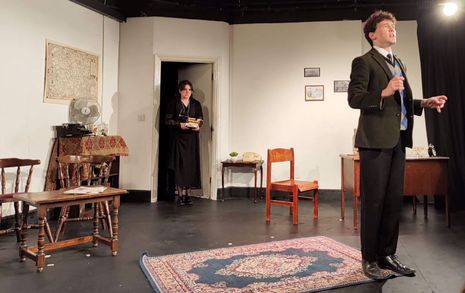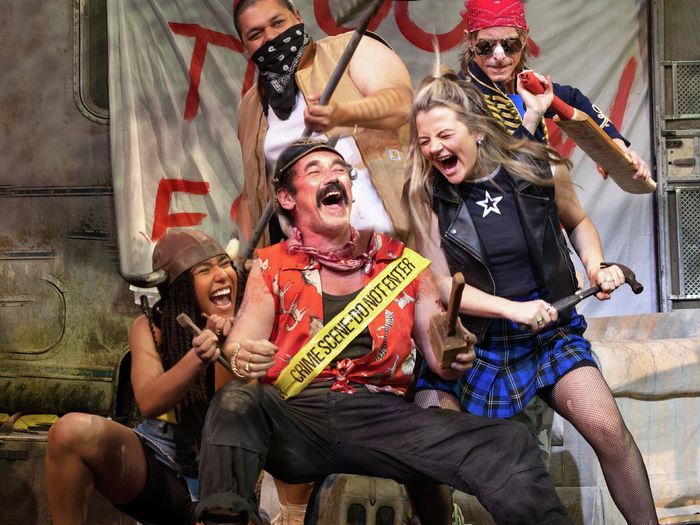An Open Book needs a revised edition
Jasmine Regan Feldman reviews An Open Book at The Corpus Playroom

An Open Book is a student-written ‘Wildean farce’ that centres on St John’s Professor, Ernest Gray (Gabriel Jones), about to become the new head of the Cambridge English Faculty. Gray’s perfect academic record is jeopardised by The Librarian (Liv Bouton) threatening to reveal the secrets of his MPhil days that he barely remembers. The rest of the cast are recognisable stereotypes you’ll find wafting around your college: the doddery emeritus fellow (Freya Cowan), the pretentious, privileged young fellow (Isabelle Duffy-Cross), and the awkwardly keen fresher (Isabella Bottle). Although the production was entertaining, I found the story struggled to tackle the themes it touched on. This left the play devoid of sorely needed nuance. Its laboured, unoriginal criticisms of Cambridge culture, instead of providing cutting satire only resulted in, as The Librarian put it, “saccharine nonsense”.
“The highlight of the show was the performances, especially given by Bouton, The Librarian, and Ernest, played by Jones”
The highlight of the show was the performances, especially given by Bouton, The Librarian, and Ernest, played by Jones. The contrasting performances were perfect for the protagonist/antagonist dynamic and suitably dramatic for a farce. The sudden, cat-like hissing attack of The Librarian was by far the funniest gag. Both Bouton and Jones lean well into the genre and assist the show by carrying the dense dialogue quite deftly. Overall the performances were effective and enjoyable.
The writing was, as intended, farcical. Writer Rosalind Moran was clearly aiming to elevate the genre, with quick-witted, silver-tongued dialogue that was suitably absurdist. Still, too often the jokes relied on cliches that jarred with the play’s internal logic. Why would a Cambridge professor need to hesitate in order to understand the semi-verbose master? Why would the librarian declare, “Who the hell is Saint John anyway?” Not only are these ideas overplayed, but also nonsensical. Why is the head of the Cambridge Faculty of English, who is constantly soliloquising Shakespeare, left baffled by undergraduate dissertation-level writing? What librarian wouldn’t know St John, the Evangelist, one of Jesus’ best mates and, ironically, the patron saint of writers? Even if you didn’t know he was THAT saint, there is a myriad of Johns littering the Bible, even Jesus’ cousin is called John. Obviously, these jokes aren’t written to inspire contemplation but, as they aren’t funny, all that the audience is left to do is unpick the thin layer of absurdism the writer has used to mask their illogical ‘wit’.
My main issue with the production is its contention with academia. I’m not saying academia isn’t a monster we should brandish pitchforks at, but that An Open Book’s angle seemed somewhat dated in its choice of target. The play focused on the boring, moral-superiority of Cambridge academics and the gate-keeping of academia from those more interesting who threaten their existence. The satire of this play is neither brave nor original. It takes shots at a dying form of academia that is neither relevant nor interesting enough to warrant a discussion that, itself, feels unsophisticated.
“Are these ideas pertinent to contemporary Cambridge? With the lack of original commentary [...] the answer seems to be no”
The choice to set the production at St John’s seemed equally unfitting in this case. Obviously, John’s reputation proceeds itself, but I’m sure the tireless work of the Student Services and Outreach programmes would hardly appreciate the cheap shots at quite an outdated reputation. Again, the lack of nuance or originality is to blame. Perhaps the setting and themes make sense if the play was set in a different period, like 10-15 years ago, but then the modern dialect, smartphones, and Macbooks seem out of place. The mixed content and themes lead to convoluted and inconsistent chronology. But, its lack of clear context also forces a different question: are these ideas pertinent to contemporary Cambridge? With the lack of original commentary on Cambridge life or culture, past or present, the answer seems to be no. Overall, the play’s themes and writing were as befuddled as its dates (how did Ernest do an MPhil in 1991, but have overdue books from 1979 - when he was 12?) and not in a fun ‘English farce’ sort of way but in a badly written sort of way.
However, a lot of my criticism is rooted in the play’s genre and perhaps my real issue is with farces. On that point, the jury is still out but An Open Book didn’t provide much evidence to sway my opinion. My criticism comes from a place of love and disappointment because I really was looking forward to this play. I love this city and its strange culture, and I feel there are so many parts of it ripe for nuanced criticism. So Cambridge, don’t stop writing self-indulgent and self-deprecating stories, whatever I say. I’ll concede: maybe I just didn’t get this one. The performances were excellent and there is clear passion behind this show.
An Open Book by Rosalind Moran is on at the Corpus Playroom until the 21st of May.
 News / Uni Scout and Guide Club affirms trans inclusion 12 December 2025
News / Uni Scout and Guide Club affirms trans inclusion 12 December 2025 News / Pembroke to convert listed office building into accom9 December 2025
News / Pembroke to convert listed office building into accom9 December 2025 Features / Searching for community in queer Cambridge10 December 2025
Features / Searching for community in queer Cambridge10 December 2025 News / Uni redundancy consultation ‘falls short of legal duties’, unions say6 December 2025
News / Uni redundancy consultation ‘falls short of legal duties’, unions say6 December 2025 News / Gov declares £31m bus investment for Cambridge8 December 2025
News / Gov declares £31m bus investment for Cambridge8 December 2025









